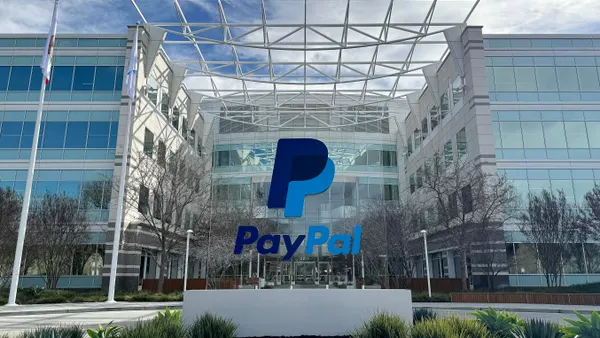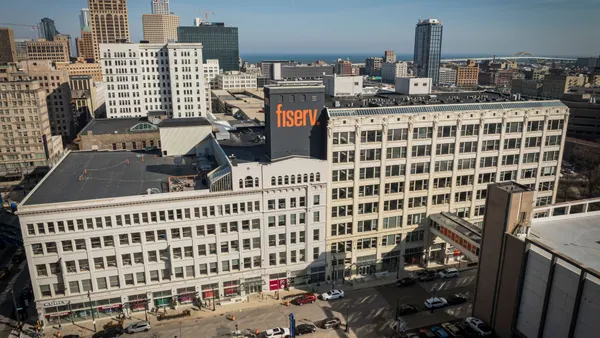Dive Brief:
- Fiserv is pursuing a merchant acquirer limited purpose bank charter in Georgia, but that doesn’t mean the payment processor is seeking to compete with its bank partners, CEO Frank Bisignano said this week.
- Before Fiserv applied for the charter, its executives talked with the American Bankers Association and communicated with clients, Bisignano said Tuesday during the company’s fourth-quarter earnings conference call with analysts. The charter would let the company authorize, settle and clear payments for merchants, removing the need for a sponsor bank partner to handle end-of-day transaction settlements.
- “This ultimately supports our smaller banks who do not have sponsorship,” Bisignano asserted. After Fiserv’s acquisition of First Data in 2019, as the company sought to cross-sell services to its community bank clients, it became clear “that our ability to sponsor them ourselves would be very valuable,” he said.
Dive Insight:
After an analyst asked Tuesday on the call about Fiserv’s pursuit of the special bank charter, including the potential timeline for approval and the benefits perceived by the company, Bisignano said he wanted to bring “pure clarity to what that is.”
There are “lots of questions” about why Brookfield, Wisconsin-based Fiserv is applying for a bank license, but the CEO stressed that it’s “a very specific purpose license.”
“Historically, you needed a bank, and that’s within the Visa and Mastercard rules,” Bisignano said Tuesday. “Our ability to be able to have an institution for that sole purpose, to allow us to be a sponsor for our own merchant acquiring in certain instances, will be valuable, as we can control more of the outcome than we could before.”
Bisignano said it’s clear to Fiserv’s bank clients that the company doesn’t seek to compete with them. “We’re in business to help our banks grow,” he said. Fiserv is applying for the charter because banks that have traditionally provided access to the card networks as sponsor banks are increasingly focusing on other areas of their business, a Fiserv spokesperson said last month.
Currently, no entity holds Georgia’s MALPB charter, which was created in 2012 and applies nationwide, according to Bo Fears, senior deputy commissioner at the Georgia Department of Banking and Finance.
Fiserv has “no intention” of becoming a traditional financial institution or regional bank, and will continue partnering with banks that remain active as acquiring sponsors, the spokesperson said last month.
An ABA spokesperson acknowledged Tuesday that Fiserv reached out to the trade group on the matter. “We appreciate the Fiserv leadership sharing their plans with us,” an ABA spokesperson said Tuesday in an email. “They informed us that they do not seek to compete with banks with this charter. We look forward to learning more about the application as the process plays out.”
Bisignano didn’t address the application’s potential approval timeline on Tuesday. The Fiserv spokesperson said last month the company expects the process to be complete sometime during the first half of the year. Fiserv is also applying for card network membership, the spokesperson said.
Although the charter was created a dozen years ago, merchant acquirers have been reluctant to apply for it because they haven’t had confidence they’d also be granted access to card networks Visa and Mastercard, attorneys have said.
Other merchant acquirers are likely to follow Fiserv’s move if the state charter is approved and the company gains access to the card networks, attorneys and consultants also noted.
“There is clearly a shift away from the traditional acquiring model,” said Thad Peterson, strategic adviser with consulting firm Datos Insights. “You don’t need a bank to move a transaction from a merchant to a payment network. That’s an artifact of the way the whole system was created originally, so it’s ripe for disruption.”











